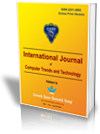Evaluation of Teacher’s Performance Using Fuzzylogic Techniques

Sirigiri Pavani, P.V.S.S.Gangadhar, Kajal Kiran Gulhare. "Evaluation of Teacher’s Performance Using Fuzzylogic Techniques"International Journal of Computer Trends and Technology (IJCTT),V3(2):195-200 Issue 2012 .ISSN 2231-2803.www.ijcttjournal.org. Published by Seventh Sense Research Group.
Abstract: - Most Institutes and Organization use performance appraisal system to evaluate the teachers performance. The teachers performance is very important to the students and as well as school management, in which usually involves crisp and uncertain values to evaluate teacher’s performance. In this paper we proposed to evaluate teachers performance on the basis of different factors, applying into fuzzy inference system (FIS) , FIS is the process of formulating the mapping from a given input to an output using fuzzy logic. We can consider some of the most relevant factors, and developed rules will be fuzzified. As input fuzzy variable performance will be fuzzified with suitable fuzzy linguistic variable and ultimately FIS will be developed. This paper explains the comparison of two different membership function and getting more or less similar, So as to achieve the shape of membership function, which is not playing much role to evaluate the performance in positive or negative direction.
References-
[1] L.A. Zadeh, ”Fuzzy algorithms,” Info. & Ctl., Vol. 12, 1968, pp. 94-102.
[2] L.A. Zadeh, ”Making computers think like people,” IEEE. Spectrum, 8/1984, pp. 26-32.
[3] S. Korner, ”Laws of thought,” Encyclopedia of Philosophy, Vol. 4, MacMillan, NY: 1967, pp. 414-417.
[4] C. Lejewski, ”Jan Lukasiewicz,” Encyclopedia of Philosophy, Vol. 5, MacMillan, NY: 1967, pp. 104-107.
[5] A. Reigber, ”My life with Kostas”, unpublished report, Neverending Story Press , 1999
[6] J.F. Baldwin, ”Fuzzy logic and fuzzy reasoning,” in Fuzzy Reasoning and Its Applications, E.H. Mamdani and B.R. Gaines (eds.), London: Academic Press, 1981.
[7] W. Bandler and L.J. Kohout, ”Semantics of implication operators and fuzzy relational products,” in Fuzzy Reasoning and Its Applications, E.H. Mamdani and B.R. Gaines (eds.), London: Academic Press, 1981.
[8] M. Eschbach and J. Cunnyngham, ”The logic of fuzzy Bayesian influence,” paper presented at the International Fuzzy Systems Association Symposium of Fuzzy information Processing in Artificial Intelligence and Operational Research, Cambridge, England: 1984.
[9] F. Esragh and E.H. Mamdani, ”A general approach to linguistic approximation,” in Fuzzy Reasoning and Its Applications, E.H. Mamdani and B.R. Gaines (eds.), London: Academic Press, 1981.
[10] J. Fox, ”Towards a reconciliation of fuzzy logic and standard logic,” Int. Jrnl. of Man-Mach. Stud., Vol. 15, 1981, pp. 213-220
Keywords — Performance Appraisal, Teacher , Student, Cascaded, Fuzzy Inference System, Sensitivity Analysis, Gaussian MF, Fuzzy Rules.


